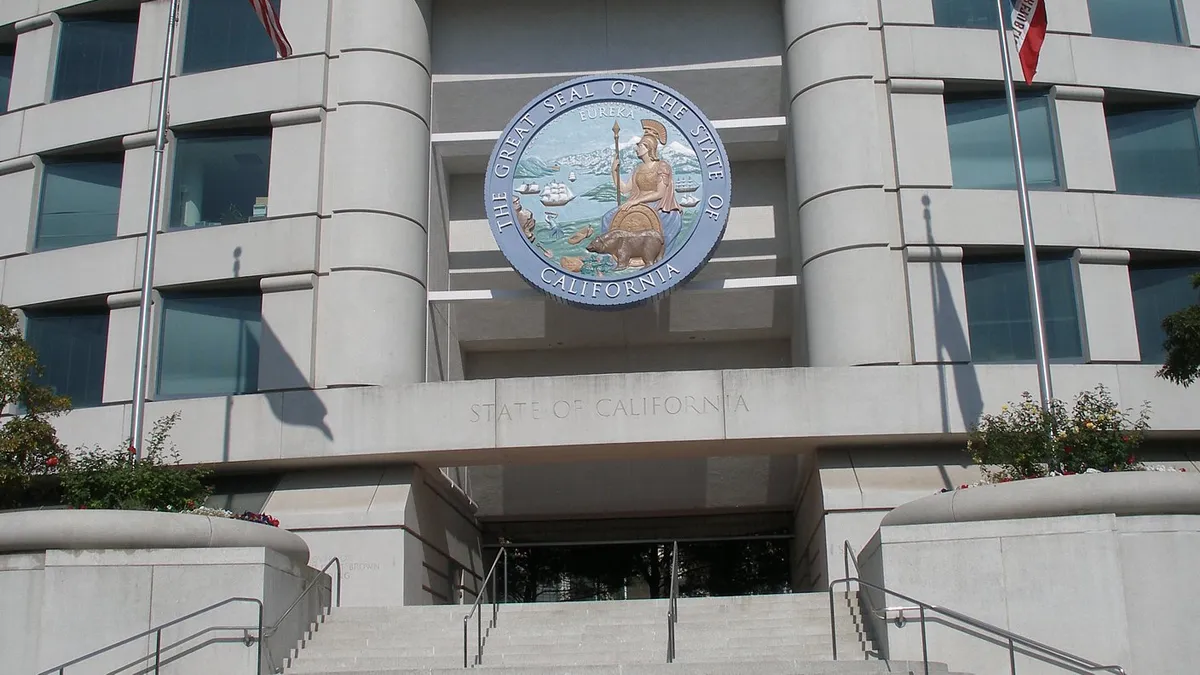Dive Brief:
- California regulators on Thursday updated a decades-old energy policy to allow the state's $1 billion annual budget for energy efficiency to be directed toward building electrification efforts, giving a boost to the state's move away from natural gas.
- The California Public Utilities Commission (CPUC) voted unanimously to alter the "three-prong test" that was originally adopted in the early 1990s to avoid encouraging programs that substitute electricity for natural gas. Efficiency advocates called the rule "an incredibly obscure piece of energy policy."
- California's greenhouse gas goals will require abandoning fossil fuels entirely, say many climate advocates. But the change had opponents, including Southern California Gas (SoCal Gas). The nation's largest gas distribution company said the new rules will "remove or reduce ratepayer protections" and obscure the real cost of some efficiency efforts.
Dive Insight:
Efficiency advocates say the CPUC vote was a major shift in the state's efforts to achieve carbon neutrality.
The change "unlocks an amount of funding that has the potential to really transform the marketplace for energy efficient appliances," Sierra Club Regional Campaign Manager Evan Gillespie told Utility Dive. "There are at least 30 years of policy and regulations that have been built out to prefer gas. ... For building electrification to succeed, it has to cut through an enormous amount of regulatory bias that disadvantages heat pumps and other appliances."
Natural Resources Defense Council (NRDC) Senior Scientist Merrian Borgeson said CPUC's decision gives the state a "clear path to roll out new programs" that include efficient electric heating technologies largely powered by wind and solar.
"At its core, the decision clarifies how to demonstrate that a measure saves energy and reduces emissions," Borgeson explained in a blog posted shortly after the PUC vote. "It also levels the playing field for all efficiency opportunities to qualify for funding by allowing fuel substitution to adhere to the same cost effectiveness requirements as other efficiency opportunities."
The decision designates the “baseline” for energy and emissions savings comparisons, specifies that carbon emissions are the measure of environmental impact, and updates how energy savings from fuel sources are determined.
NRDC would have liked to see the changes go further, however. Borgeson said the three-prong test changes still do not allow funding for switching away from unregulated fuels such as propane and wood. That leaves out "a group of often rural and lower-income customers even though they pay into the electric efficiency funds," she wrote.
But the decision does indicate the issues will be addressed in the CPUC's proceeding on building decarbonization, and Borgeson said some commissioners have already indicated their support.
While advocates say the decision will ultimately provide economic benefits, a group of "concerned energy users and providers" from Central and Southern California, the day before the PUC vote, warned of the impacts on a range of consumers.
"This regulation will limit consumer choice of energy options and would misallocate utility ratepayer funds
to measures that are not cost-effective," the group wrote.
Similarly, SoCal Gas told regulators the decision "has the potential to remove or reduce ratepayer protections by masking the cost or inflating the benefit of new [energy efficiency] technology, encourage fuel wars between gas and electric, and impact energy affordability and grid reliability."
Sierra Club's Gillespie said California has to quit burning natural gas if it wants to meet its climate goals.
"This is a massive step in the right direction," he said. The PUC's decision "changes an incredibly obscure piece of energy policy. ... The state is quickly recognizing there is no pathway to meet its climate goals without widespread electrification."















